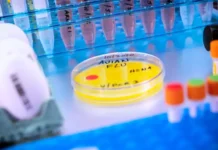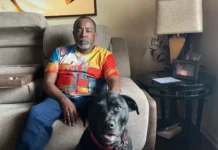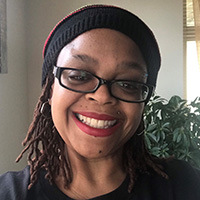
after surviving her 94-battle with
COVID-19. Photo courtesy of Tia
Shabazz.
By Aaron Allen, The Seattle Medium
The average person may not personally know someone who has contracted the COVID-19 coronavirus, and while some may still believe it’s like having a severe case of the flu, Tia Shabazz’s story about her 94-day battle with COVID-19 provides a first-hand account of the devastation the virus can have on individuals, their families and our community.
One common thread in the responses to COVID-19 by people who have experienced it or have known someone who has is, “this is real.”
While fighting for her own survival, Shabazz was forced to watch the virus take its toll on her family as well. Her Stepmother, who had recently been diagnosed with cancer, lost her battle to COVID-19 weeks before and her sister contracted the virus also had to quarantine herself for 14 days and was finally cleared to return to work. In addition, her brother was temporarily placed on dialysis because the virus had attacked his kidneys.
Shabazz, a fiscal specialist for the University of Washington and mother of two, says she contracted the virus in March while attending a funeral for a family member. Little did she know at the time that COVID-19 would test her and her family in every way possible – spiritually, emotionally and physically.
A few days later after the funeral, Shabazz woke up with a slight fever that drastically increased in the course of few hours.
“I woke up that morning with a fever of 99.5 degrees,” Shabazz recalled. “A few hours later my temperature went up to 103.8.”
Shabazz, on the advice of her doctor, immediately sought medical attention.
“I called my doctor and their advice was that I go to a testing site, so I immediately went to a site on Capitol Hill which when I arrived I was told by a police officer that the site was closed and not receiving any new patients,” said Shabazz. “So, from there I went to the ER at Swedish, explained to them my symptoms and they admitted me to the hospital and began to take tests.”
According to medical experts, COVID-19 affects different people in different ways. Infected people can have a wide range of symptoms which can be mild or in some cases severe. These symptoms may appear 2-14 days after exposure to the virus and include: fever and chills, cough, shortness of breath or difficulty breathing, fatigue, muscle and body aches, headaches, loss of taste and smell and others.
For Shabazz, she experienced multiple symptoms at various stages during her COVID-19 battle.
“It was frustrating and depressing because as one symptom went away and I thought I was getting closer to the end as far as the healing process was concerned then something else would come up and it would basically restart my countdown towards being symptom free,” says Shabazz. “And that was very frustrating because every time a new symptom came up it set me back to square one [in my recovery process].”
Upon being admitted in the emergency room, Shabazz was placed in the COVID unit separate from the designated emergency room area, where she was isolated alone until a doctor or nurse could see her. As she walked through the hospital, she noticed the difference in the way hospitals dealt with virus patients versus emergency room patients.
“They had the ER separated so they had a certain area that COVID patients entered,” recalled Shabazz. “I went in and they ran a bunch of tests and then they tested me for the regular flu which was negative and [they told me that] my COVID results would take four to five days.”
After her visit to the emergency room visit, the doctors sent Shabazz home for self-quarantine and isolation until her results came back.
Four days later Shabazz learned she was positive for COVID-19. Upon learning her position Shabazz was rightfully shaken and afraid.
“I was scared,” said Shabazz. “I was [really] scared because my stepmother had just passed from it.”
About 30 days in to her isolation, Shabazz, who has a history of asthma, began to experience breathing complications. She also began to develop pink eye in both eyes, and Shabazz found herself back in the emergency room after experiencing persistent and worrisome chest pains.
Shabazz also began experiencing additional symptoms. Pain in her muscles, face and jaw alarmed her and because it was difficult for her to be physically seen by a doctor she was unable, at the time, to convey the discomfort she was experiencing.
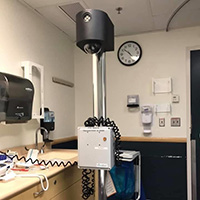
staff communicated and monitored
Shabazz with a telesitter, pictured
above.
“I ended up going back to the ER because I was having severe pain in my chest and so much trouble breathing, just to take a deep breath,” says Shabazz. “A nurse brought in what is called a “telesitter” and it looks like an IV pole but it has a camera and microphone on it and that’s how I was going to be seen at that visit because doctors were not going in the rooms.”
During this second visit, doctors took MRIs of Shabazz and discovered that she had developed Bronchitis. They prescribed her with antibiotics, which they later found were not effective on COVID symptoms so Shabazz had to just endure and let her body recover without the benefits of antibiotics.
After prescribing Shabazz with the other medications, they sent her home again for self-quarantine. Curious as to why they kept sending her home and not just admitting her, Shabazz learned that hospitals were not admitting anyone who were not in critical condition.
“I asked if they could just admit me and their response was, ‘we are not admitting any COVID patients that are not in ICU,’” Shabazz states. “’The only ones we are admitting are people who need ventilators or other emergencies like cancer.’”
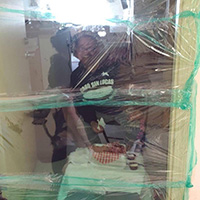
interacted with friends and family
that came by to drop of food and
other supplies through a plastic
barrier that covered her front door.
Over the course of the next thirty days in self-quarantine, Shabazz endured pain and discomfort as the virus began taking its toll on her emotionally and physically.
Throughout this time Shabazz had to depend on her family and friends to help with things such as grocery shopping, and taking out the garbage, while dealing with the emotional strains of isolation and the possibility of dying.
Khalil Shabazz, Tia Shabazz’s son, who came home early from college only to learn that his mother had contracted the deadly disease, did all he could to help his mother through this trying and uncertain time.
“During that time, I helped as much as could by going to the store for her, getting groceries and things like toiletries and just trying to be there for her in any way possible,” says the younger Shabazz.
With so much uncertainty related to the virus and her health, Shabazz wanted to get her house in order and with the help of her sister she began preparing for the worst.
“I did think about dying, I thought about how unprepared I really was,” says Shabazz. “I thought about life insurance, burial plots, making sure all of my affairs were in order so that whoever had to handle that stuff it would be easy.”
Nanette Gleason, Shabazz’s sister, hated to see what her sister had to go through and wants to let others know that COVID-19 is serious and is nothing to play around with.
“This is more serious than people think it is,” says Gleason.”
“I’ve seen people who think they are untouchable which you know,” continued Gleason. “With the experience of my sister and my mom, I mean when it hits your family, and you don’t want that to happen, but when it hits your family then you are like yes this is serious.”
Khalil Shabazz agrees and is warning others to do what you can to protect yourself and others.
“This is real! A lot of things that happen to people do not really affect you unless it happens to your family,” says Khalil. “It affects you dramatically, this is real.”
Now days, except for stints of fatigue and exhaustion, Shabazz says that she has recovered from COVID-19. She is back to working remotely on a part-time basis and quite simply feels, “Blessed!”
“I’ve recovered,” says Shabazz. “I have no symptoms except fatigue. I am back to work on a part-time basis at the University of Washington, working from home. But, all in all I am doing good and I am blessed.”


